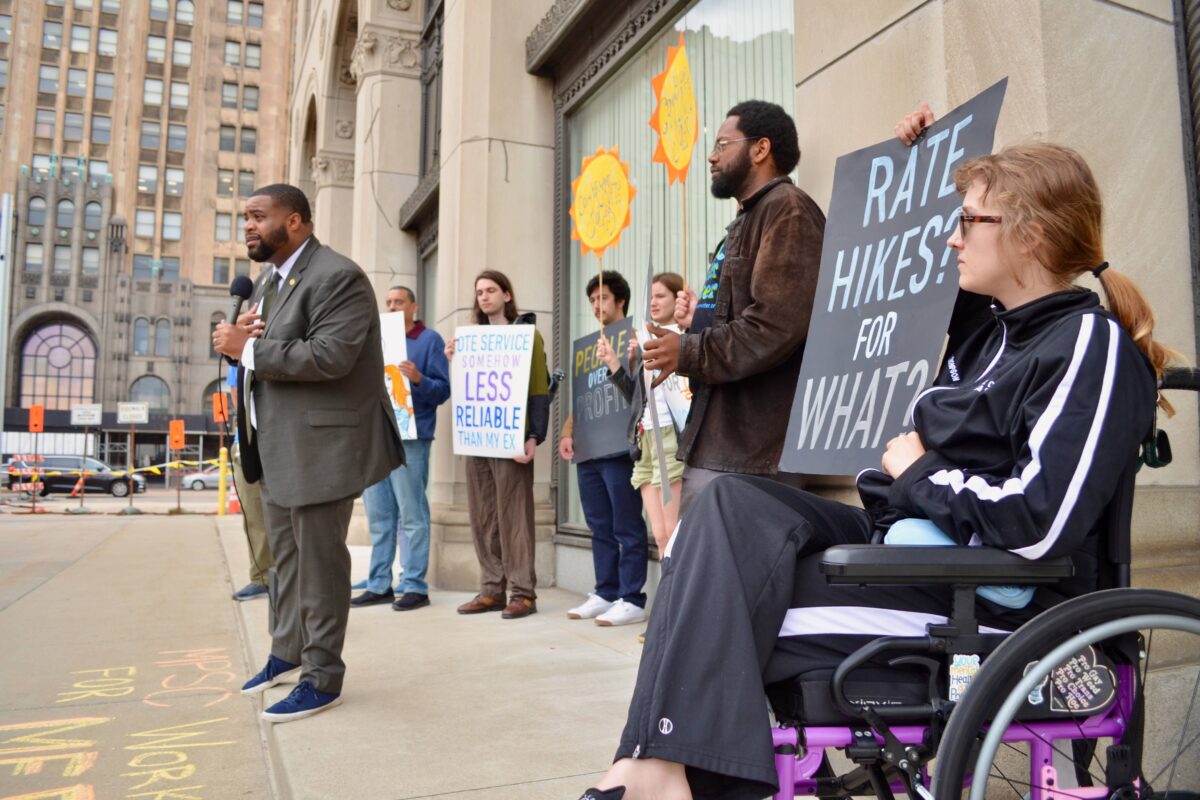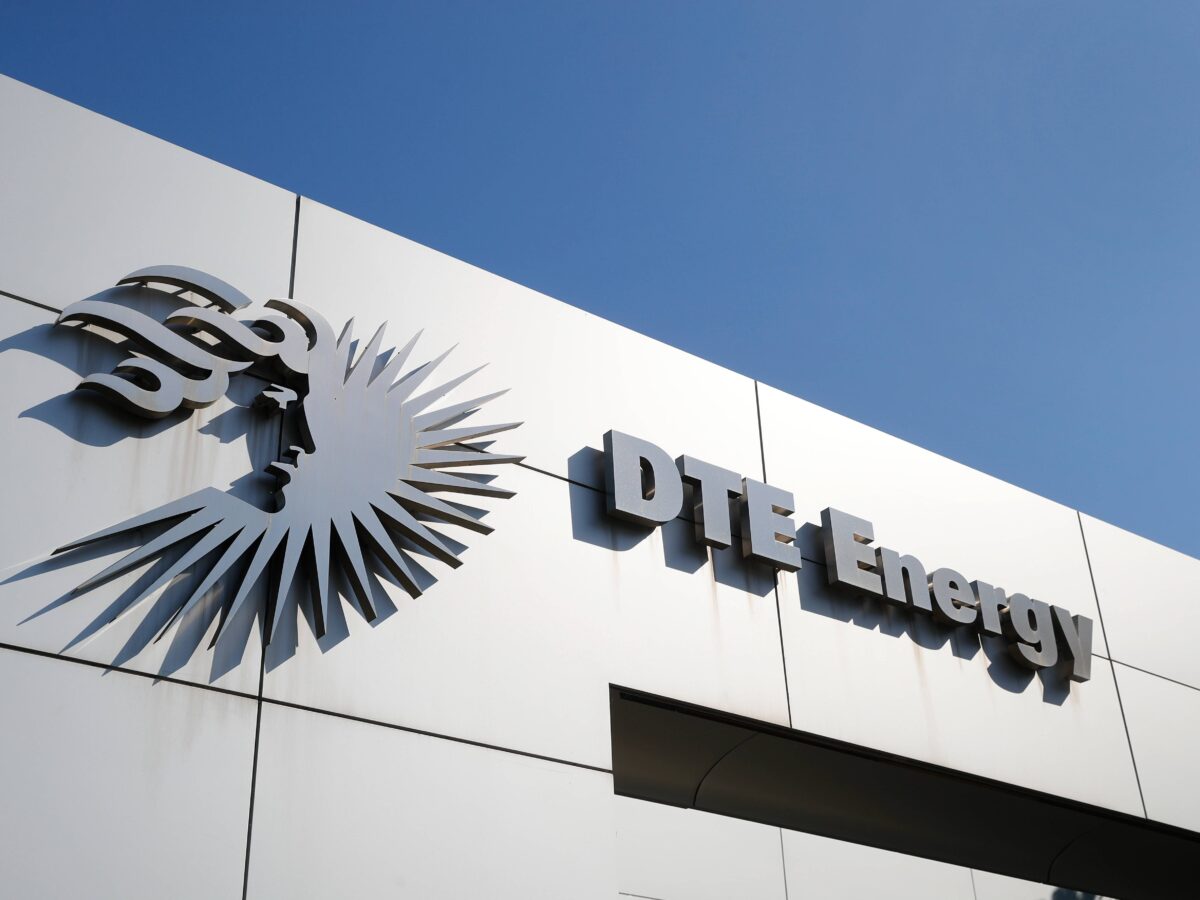Overview:
- Utilities like DTE Energy and Consumers Energy are regulated by the Michigan Public Service Commission.
- While many Michiganders may not be aware of the MPSC, the commission makes critical decisions such as the dollar amount of rate hikes requested by utilities.
- Planet Detroit created this guide for Michiganders to gain a better understanding of what the MPSC does, who it serves, and how to get involved.
Table of contents
The Michigan Public Service Commission plays a powerful role in regulating how utilities operate in and around the state — and the public’s involvement in the process is just as vital.
So why do so few Michiganders have a grasp of how the commission functions? Journalist and climate activist Bill McKibben told the New York Times that public service commissions often fly under the radar because they’re “protected by a force field of their own boringness,” discouraging individuals from participating in the process.
In hopes of breaking through that force field, Planet Detroit created this guide for Michiganders to gain a better understanding of what the Michigan Public Service Commission — or MPSC — does, who it serves, and how to get involved.
What is the Michigan Public Service Commission?
The MPSC is a three-person public body that regulates privately owned electric utilities, natural gas providers and pipelines, and to a lesser extent, phone and cable services across the state.
As “regulated monopolies,” investor-owned utilities, or IOUs, like DTE Energy and Consumers Energy, must get approval from the commission before making any major changes that affect the power grid or their customers.
When was the MPSC created and why?
The state Legislature first established the Michigan Public Service Commission in 1939. Originally operating as a five-person body, the regulatory agency was created to fill the void left after legislators disbanded the Michigan Public Utilities Commission, which oversaw a variety of utilities including rail, electric, natural gas, steam, telephone service, ferry service, and more.
The MPSC inherited its predecessor’s responsibilities, though over time the commission played less of a direct role in regulating telecommunication companies.
The commission temporarily had jurisdiction over water utilities from 1967 until 1995 — when state legislators repealed the law — as well as the regulation of motor carriers from 1968 until an executive order transferred the responsibility to the Michigan State Police in 1982.
What does MPSC regulate today?
The Michigan Public Service Commission regulates three main industries:
Electricity
MPSC regulates all investor-owned public utilities that distribute electricity to Michigan customers.
Seven IOUs are operating in the state of Michigan:
- Alpena Power Co.
- Consumers Energy Co.
- DTE Energy Co.
- Indiana Michigan Power Co.
- Northern States Power Co. – Wisconsin (Xcel Energy)
- Upper Michigan Energy Resources Corp.
- Upper Peninsula Power Co.
The commission oversees all conditions of service for these utilities and has the power to approve or deny rate increases, new energy projects or expansions, infrastructure upgrades and more. DTE Energy and Consumers Energy are the largest investor-owned electric utilities operating in the state.
The MPSC requires that all IOUs submit a long-term plan, known as an Integrated Resource Plan, or IRP, to ensure that electric energy supply will continue to meet or exceed demand, and to help utilities adhere to the latest policy standards and energy goals.
Natural Gas
The MPSC regulates the storage, transmission, and distribution of natural gas to ensure providers are following statewide safety and technical standards. Regulators also have jurisdiction to approve or deny residential and commercial rate changes and conditions of service like metering or billing.
Seven natural gas utilities are under MPSC’s purview:
- Consumers Energy Co.
- DTE Energy Co.
- Michigan Gas Utilities Corp.
- Northern States Power Co. – Wisconsin (Xcel Energy)
- SEMCO Energy Gas Co.
- Upper Michigan Energy Resources Corp.
- Upper Peninsula Power Co.
Telecommunications
The commission no longer regulates retail rates for telecom services like phone, cable, and internet, but it still provides minimal oversight related to quality of service, reliability, and consumer protection.
How is the MPSC structured?
Commission members are appointed by the governor and typically serve staggered six-year terms. One commissioner is selected by the governor to serve as chairperson of the body, and no more than two members can share the same political affiliation.
Supported by a staff of about 200 people across nine divisions, the commission is tasked with making determinations in a variety of cases, ranging from proposed rate changes, energy upgrades, and licensing renewals to consumer disputes, administrative rulemaking, and more.
As a state agency, the MPSC is required to provide opportunities for public engagement related to matters under its jurisdiction. As such, anyone who would like to voice their opinion about a case before the commission can do so by filing a public comment or attending a regularly scheduled meeting either virtually or in-person.
Who serves on the commission?
Commissioner Dan Scripps (Term ends July 2, 2029)
- Appointed by Gov. Gretchen Whitmer in February 2019 and named MPSC chair in July 2020.
- Active in several state energy advisory groups.
- Former member of the Michigan House of Representatives.
- Graduate of Alma College and the University of Michigan Law School.
Commissioner Katherine Peretick (Term ends July 2, 2027)
- Appointed by Whitmer in January 2021 and reappointed in July 2021.
- Previously worked in the public and private sectors with a focus on energy storage and technology development.
- Worked on the Juno and Curiosity spacecraft missions with NASA’s Jet Propulsion Laboratory.
- Holds a bachelor of science in mechanical engineering and a masters in energy systems engineering from the University of Michigan.
Commissioner Shaquila Myers (Term ends July 2, 2031)
- Appointed by Whitmer in July 2025 to replace outgoing Commissioner Alessandra Carreon.
- Former senior advisor to the governor.
- Served as chief of staff for former Michigan House Speaker Joe Tate (D-Detroit) and Lt. Gov. Garlin Gilchrist.
- Former legislative director for Senate Democratic Leader Jim Ananich and policy analyst for the Michigan Senate.
- Holds a masters of public administration and an undergraduate degree from Oakland University.
Whitmer drew criticism from environmental groups over the summer when she made the decision not to reappoint Carreon to the MPSC upon the expiration of her partial term on July 2.
In a June 2025 letter citing concerns about the MPSC’s integrity, a coalition of nearly 20 environmental organizations referred to Carreon as “the clearest voice for frontline communities” who “drove efforts to make the clean-energy transition both affordable and inclusive.”
Despite those concerns, Whitmer appointed Shaquila Myers — her former senior advisor — in Carreon’s place, leading many to speculate whether the decision was politically motivated.
Who is the MPSC meant to serve?
State regulators are required to balance consumer interests against the interests of utilities and the importance of fostering competitive markets to ensure Michigan residents are receiving “safe, reliable and accessible energy and telecommunications services at reasonable rates,” according to the MPSC’s website.
How does the MPSC affect me?
Many Michiganders — including Michigan Attorney General Dana Nessel — have harshly criticized DTE and Consumers in recent years for making more frequent rate hike requests.
In April, DTE filed for a $574.1 million rate hike case — its second-highest request in company history and the fourth in five years — months after state regulators approved a $217 million increase for the utility. That increase amounted to approximately $4.61 more per month for the average customer.
Consumers Energy similarly filed a $436 million electricity rate increase request with the commission in June, only three months after receiving approval for a $153.8 million rate increase that raised rates by $2.78 per month for customers on average.
In both cases, the utilities were approved for significantly lower rate increases than what they sought.
Nessel has referred to the continuous rate increase requests by DTE and Consumers as “an endless cycle,” accusing them of prioritizing profitability over improving service.
🗳️ Civic next steps: How you can get involved
Why it matters
⚡ The Michigan Public Service Commission’s decisions affect the amount you pay for electricity and natural gas service, the utilities’ role in Michigan’s shift to clean energy, the reliability of utilities like DTE Energy and Consumers Energy, and the investments they make.
Who’s making civic decisions
🏛️ The Michigan Public Service Commission. Any member of the public who seeks to share their input on a case before the commission can do so by attending a regularly scheduled meeting, either virtually or in person, and participating in the public comment period.
💻 Additionally, comments may be submitted online through the commission’s Electronic Docket Filings System (E-Dockets), where residents can search for specific cases by the case or filing number. Any comments submitted by the public will become part of the public case record and reviewed by the commission.
How to take civic action now
- 📅 Attend a MPSC meeting. The next regular commission meetings will take place at 1 p.m. on Thursday, Oct. 9 and Thursday, Nov. 6 at the MPSC offices located at 7109 W. Saginaw Hwy. in Lansing and virtually.
- 📞 Residents can contact commissioners by phone at 800-292-9555 or 517-284-8100, via email at LARA-MPSC-commissioners@michigan.gov, or by mail at PO Box 30221, Lansing, MI, 48909
- 🔎 View step-by-step instructions on how to submit a public comment on a case before the commission here.
- 🌱 Follow advocacy groups like the Michigan Environmental Council or 5 Lakes Energy
- ✋ Participate at the MPSC’s upcoming public hearing where Michigan residents can weigh in on the long-range planning for the state’s electric utilities. It’s from 6-7:30 p.m. Monday, Oct. 27 in Room 123 of building seven on the Auburn Hills campus of Oakland Community College, 2900 Featherstone Road.
- 🗣️ Ask for help paying your utility bills. Reach out to the commission for help applying for home energy assistance, service shutoff protections, payment assistance, and more. View the full list of assistance programs available here.
What to watch for next
🗓️ Upcoming MPSC rate case decisions, meetings, and public hearings.
Civic impact
🌍 Staying engaged with the MPSC process is one way residents can shape Michigan’s energy future.
MORE PLANET DETROIT REPORTING
Michigan utility customers suffered nation’s longest power outages in 2023: How DTE, Consumers contributed
Utility watchdog criticizes Michigan regulator’s response to report, arguing it ignores the real experience of customers.
Transfer prices and your bill: What Michigan’s clean energy law means for you
In Michigan, the Public Service Commission’s deliberations on clean energy pricing and utility credits impact how quickly the state converts to renewable energy.
Michigan utility commissioner appointment sparks environmental justice concerns
Whitmer praises new MPSC appointee Shaquila Myers’ work on clean energy legislation, but ratepayer advocates say they fear utilities influenced governor’s decision.





